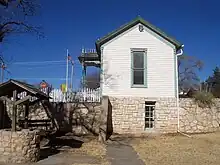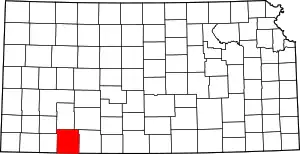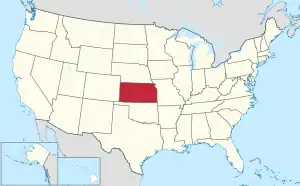Meade County | |
|---|---|
 Dalton Gang Hideout and Museum in Meade (2006) | |
 Location within the U.S. state of Kansas | |
 Kansas's location within the U.S. | |
| Coordinates: 37°14′N 100°22′W / 37.233°N 100.367°W | |
| Country | |
| State | |
| Founded | March 20, 1873 |
| Named for | George G. Meade |
| Seat | Meade |
| Largest city | Meade |
| Area | |
| • Total | 979 sq mi (2,540 km2) |
| • Land | 978 sq mi (2,530 km2) |
| • Water | 1.3 sq mi (3 km2) 0.1% |
| Population | |
| • Total | 4,055 |
| • Density | 4.1/sq mi (1.6/km2) |
| Time zone | UTC−6 (Central) |
| • Summer (DST) | UTC−5 (CDT) |
| Area code | 620 |
| Congressional district | 1st |
| Website | County website |
Meade County is a county located in the U.S. state of Kansas. Its county seat and largest city is Meade.[2] As of the 2020 census, the county population was 4,055.[1] The county was created in 1873 and named in honor of George Meade, a general during the American Civil War.[3]
History
For millennia, the Great Plains of North America were inhabited by nomadic Native Americans.
In 1854, the Kansas Territory was organized, then in 1861 Kansas became the 34th U.S. state.
In 1873, Meade County was established. The first permanent settlement in the county was established in 1878 at Meade City, 12 miles north of the city of Meade. Pearlette was settled shortly thereafter in 1879 by a company of sixteen families from Zanesville, Ohio led by John Jobling.[4] The railroad first entered the country in 1887, ending a decade in which supplies had to be hauled from Dodge City.[4]
On August 24, 1874, in Meade County, Mochi, Medicine Water and the other members of their band of Cheyenne massacred a surveying party led by Capt. Oliver Francis Short, who had fought in the Union Army during the American Civil War. This event became known as the Lone Tree Massacre. Short, his 14-year-old son Truman, and four other members of the party were killed, with three of them being scalped.[5][6]
Meade County became known as a hotbed of thievery and cattle rustling in the 1880s and 1890s. Eva Dalton Whipple lived with her husband in Meade County and allowed her house to be used as a hide for her brothers, the infamous Dalton Gang. The Dalton Gang Hideout and Museum was restored by the WPA in the 1930s and today is on the National Register of Historic Places.[7]
A large sinkhole filled with saltwater, known as the Salt Well, appeared in the county on March 16, 1879. William Sturgis first produced commercial solar salt from the Salt Well in 1880, and floating in its salty water was a tourist attraction at the turn of the 20th century.[8]
Like the rest of southwestern Kansas, Meade County was devastated by the Dust Bowl in the 1930s.[6]
Geography
According to the U.S. Census Bureau, the county has a total area of 979 square miles (2,540 km2), of which 978 square miles (2,530 km2) is land and 1.3 square miles (3.4 km2) (0.1%) is water.[9]
Adjacent counties
- Gray County (north)
- Ford County (northeast)
- Clark County (east)
- Beaver County, Oklahoma (south)
- Seward County (west)
- Haskell County (northwest)
Demographics

| Census | Pop. | Note | %± |
|---|---|---|---|
| 1880 | 296 | — | |
| 1890 | 2,542 | 758.8% | |
| 1900 | 1,581 | −37.8% | |
| 1910 | 5,055 | 219.7% | |
| 1920 | 5,542 | 9.6% | |
| 1930 | 6,858 | 23.7% | |
| 1940 | 5,522 | −19.5% | |
| 1950 | 5,710 | 3.4% | |
| 1960 | 5,505 | −3.6% | |
| 1970 | 4,912 | −10.8% | |
| 1980 | 4,788 | −2.5% | |
| 1990 | 4,247 | −11.3% | |
| 2000 | 4,631 | 9.0% | |
| 2010 | 4,575 | −1.2% | |
| 2020 | 4,055 | −11.4% | |
| U.S. Decennial Census[10] 1790-1960[11] 1900-1990[12] 1990-2000[13] 2010-2020[1] | |||
As of the census[14] of 2000, there were 4,631 people, 1,728 households, and 1,252 families residing in the county. The population density was 5 people per square mile (1.9 people/km2). There were 1,968 housing units at an average density of 2 per square mile (0.77/km2). The racial makeup of the county was 91.10% White, 0.39% Black or African American, 0.54% Native American, 0.22% Asian, 6.24% from other races, and 1.51% from two or more races. 10.90% of the population were Hispanic or Latino of any race.
There were 1,728 households, out of which 36.40% had children under the age of 18 living with them, 64.70% were married couples living together, 4.90% had a female householder with no husband present, and 27.50% were non-families. 25.60% of all households were made up of individuals, and 13.60% had someone living alone who was 65 years of age or older. The average household size was 2.61 and the average family size was 3.16.
In the county, the population was spread out, with 29.50% under the age of 18, 6.90% from 18 to 24, 26.50% from 25 to 44, 19.20% from 45 to 64, and 17.90% who were 65 years of age or older. The median age was 36 years. For every 100 females there were 98.20 males. For every 100 females age 18 and over, there were 95.00 males.
The median income for a household in the county was $36,761, and the median income for a family was $41,550. Males had a median income of $29,295 versus $20,153 for females. The per capita income for the county was $16,824. About 6.70% of families and 9.30% of the population were below the poverty line, including 11.90% of those under age 18 and 5.70% of those age 65 or over.
Government
Meade County is usually carried by Republican candidates. The last time a Democratic presidential candidate carried the county was in 1936, when Franklin D. Roosevelt won a landslide victory nationwide.
Presidential elections
| Year | Republican | Democratic | Third party | |||
|---|---|---|---|---|---|---|
| No. | % | No. | % | No. | % | |
| 2020 | 1,523 | 83.45% | 263 | 14.41% | 39 | 2.14% |
| 2016 | 1,415 | 81.70% | 210 | 12.12% | 107 | 6.18% |
| 2012 | 1,428 | 83.56% | 258 | 15.10% | 23 | 1.35% |
| 2008 | 1,540 | 79.75% | 357 | 18.49% | 34 | 1.76% |
| 2004 | 1,748 | 82.41% | 356 | 16.78% | 17 | 0.80% |
| 2000 | 1,604 | 78.13% | 400 | 19.48% | 49 | 2.39% |
| 1996 | 1,443 | 70.08% | 426 | 20.69% | 190 | 9.23% |
| 1992 | 1,135 | 52.45% | 430 | 19.87% | 599 | 27.68% |
| 1988 | 1,322 | 65.19% | 664 | 32.74% | 42 | 2.07% |
| 1984 | 1,804 | 77.16% | 491 | 21.00% | 43 | 1.84% |
| 1980 | 1,618 | 71.66% | 482 | 21.35% | 158 | 7.00% |
| 1976 | 1,109 | 51.53% | 983 | 45.68% | 60 | 2.79% |
| 1972 | 1,712 | 74.56% | 526 | 22.91% | 58 | 2.53% |
| 1968 | 1,511 | 66.24% | 572 | 25.08% | 198 | 8.68% |
| 1964 | 1,290 | 51.77% | 1,179 | 47.31% | 23 | 0.92% |
| 1960 | 1,826 | 70.47% | 754 | 29.10% | 11 | 0.42% |
| 1956 | 1,720 | 74.30% | 575 | 24.84% | 20 | 0.86% |
| 1952 | 2,061 | 76.90% | 568 | 21.19% | 51 | 1.90% |
| 1948 | 1,406 | 60.19% | 834 | 35.70% | 96 | 4.11% |
| 1944 | 1,424 | 68.23% | 631 | 30.23% | 32 | 1.53% |
| 1940 | 1,618 | 61.13% | 970 | 36.65% | 59 | 2.23% |
| 1936 | 1,218 | 46.58% | 1,394 | 53.31% | 3 | 0.11% |
| 1932 | 1,248 | 49.50% | 1,231 | 48.83% | 42 | 1.67% |
| 1928 | 1,709 | 73.16% | 618 | 26.46% | 9 | 0.39% |
| 1924 | 1,290 | 66.94% | 472 | 24.49% | 165 | 8.56% |
| 1920 | 1,236 | 70.95% | 483 | 27.73% | 23 | 1.32% |
| 1916 | 973 | 44.96% | 977 | 45.15% | 214 | 9.89% |
| 1912 | 204 | 18.26% | 383 | 34.29% | 530 | 47.45% |
| 1908 | 560 | 56.22% | 386 | 38.76% | 50 | 5.02% |
| 1904 | 383 | 66.38% | 166 | 28.77% | 28 | 4.85% |
| 1900 | 238 | 53.24% | 209 | 46.76% | 0 | 0.00% |
| 1896 | 203 | 50.50% | 195 | 48.51% | 4 | 1.00% |
| 1892 | 261 | 54.83% | 0 | 0.00% | 215 | 45.17% |
| 1888 | 578 | 56.78% | 342 | 33.60% | 98 | 9.63% |
Laws
The Kansas Constitution was amended in 1986 to allow the sale of alcoholic liquor by the individual drink with the approval of voters, either with or without a minimum of 30% of sales coming from food. Meade County is one of 67 counties in the state that allows for the sale of liquor by the drink with the minimum food sales stipulation.[16]
Education
Unified school districts
- Fowler USD 225
- Meade USD 226
Communities

Cities
Unincorporated community
Townships
Meade County is divided into nine townships. None of the cities within the county are considered governmentally independent, and all figures for the townships include those of the cities. In the following table, the population center is the largest city (or cities) included in that township's population total, if it is of a significant size.
| Township | FIPS | Population center |
Population | Population density /km2 (/sq mi) |
Land area km2 (sq mi) | Water area km2 (sq mi) | Water % | Geographic coordinates |
|---|---|---|---|---|---|---|---|---|
| Cimarron | 13325 | 93 | 0 (1) | 303 (117) | 2 (1) | 0.57% | 37°4′34″N 100°30′42″W / 37.07611°N 100.51167°W | |
| Crooked Creek | 16450 | 92 | 1 (2) | 141 (54) | 0 (0) | 0.06% | 37°24′41″N 100°19′30″W / 37.41139°N 100.32500°W | |
| Fowler | 24200 | Fowler | 749 | 3 (7) | 271 (105) | 0 (0) | 0.01% | 37°23′8″N 100°11′46″W / 37.38556°N 100.19611°W |
| Logan | 42000 | 100 | 0 (1) | 284 (110) | 0 (0) | 0.01% | 37°14′30″N 100°11′58″W / 37.24167°N 100.19944°W | |
| Meade Center | 45350 | Meade | 1,968 | 7 (18) | 280 (108) | 0 (0) | 0.14% | 37°16′15″N 100°20′15″W / 37.27083°N 100.33750°W |
| Mertilla | 46025 | 221 | 1 (1) | 389 (150) | 0 (0) | 0.02% | 37°24′33″N 100°30′58″W / 37.40917°N 100.51611°W | |
| Odee | 52075 | 50 | 0 (1) | 246 (95) | 0 (0) | 0.13% | 37°2′47″N 100°22′14″W / 37.04639°N 100.37056°W | |
| Sand Creek | 62925 | 38 | 0 (0) | 272 (105) | 0 (0) | 0.03% | 37°3′59″N 100°9′46″W / 37.06639°N 100.16278°W | |
| West Plains | 77300 | Plains | 1,320 | 4 (10) | 348 (134) | 0 (0) | 0.13% | 37°14′59″N 100°33′45″W / 37.24972°N 100.56250°W |
See also
- Community information for Kansas
References
- 1 2 3 "QuickFacts; Meade County, Kansas; Population, Census, 2020 & 2010". United States Census Bureau. Archived from the original on August 18, 2021. Retrieved August 17, 2021.
- ↑ "Find a County". National Association of Counties. Retrieved June 7, 2011.
- ↑ Blackmar, Frank Wilson (1912). Kansas: A Cyclopedia of State History, Volume 2. Standard Publishing Company. p. 249.
- 1 2 Sullivan, Frank (1916). A History of Meade County, Kansas. p. 21. ISBN 978-1104594145.
- ↑ Montgomery, F.C. (May 1932), "United States Surveyors Massacred by Indians", Kansas Historical Quarterly, Kansas Historical Society, 1 (3): 266–272, retrieved April 21, 2011
- 1 2 "Meade County, Kansas - Kansapedia - Kansas Historical Society". www.kshs.org. Retrieved September 27, 2023.
- ↑ "Meade County, Kansas - Kansapedia - Kansas Historical Society". www.kshs.org. Retrieved September 27, 2023.
- ↑ Sullivan, Frank (1916). A History of Meade County, Kansas. p. 98. ISBN 978-1104594145.
- ↑ "US Gazetteer files: 2010, 2000, and 1990". United States Census Bureau. February 12, 2011. Retrieved April 23, 2011.
- ↑ "U.S. Decennial Census". United States Census Bureau. Retrieved July 27, 2014.
- ↑ "Historical Census Browser". University of Virginia Library. Retrieved July 27, 2014.
- ↑ "Population of Counties by Decennial Census: 1900 to 1990". United States Census Bureau. Retrieved July 27, 2014.
- ↑ "Census 2000 PHC-T-4. Ranking Tables for Counties: 1990 and 2000" (PDF). United States Census Bureau. Archived (PDF) from the original on March 27, 2010. Retrieved July 27, 2014.
- ↑ "U.S. Census website". United States Census Bureau. Retrieved January 31, 2008.
- ↑ "Dave Leip's Atlas of U.S. Presidential Elections".
- ↑ "Map of Wet and Dry Counties" (PDF). Kansas Department of Revenue Alcoholic Beverage Control. December 30, 2019. Archived (PDF) from the original on November 4, 2020. Retrieved November 4, 2020.
- Notes
Further reading
- A History of Meade County, Kansas; Frank Sullivan; 184 pages; 1916.
- Plat Book of Meade County, Kansas; R. P. Ice Co; 43 pages; 1909.
External links
- County
- Historical
- Maps